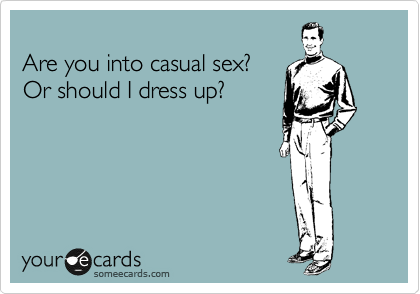Normally, I just include snippets of articles but this one is too nuanced to chop it up. So in its entirety, from the Pacific Standard:
Casual Sex Is Actually Excellent for You, If You Love Casual Sex By Ryan Jacobs
New research suggests that not all casual sex is bad. For those legitimately interested, it can boost life satisfaction and self-esteem and lessen anxiety.
A lot of psychology researchers are giant prudes. In previous studies of bedding strangers, some have suggested that pretty much all casual sex is detrimental to your psychological well-being. As a new study published in Social Psychological and Personality Science notes, they’ll rattle off negatives like “less enjoyment and nurturance than romantic sex, frequent regret, unwanted emotional attachment, substance use, and social stigma.” There are others, too, of course: cheap wine and awkward conversation in a smelly apartment, haphazardly setting off stairwell fire exit alarms as you sneak out into the night, or a long and lonely morning walk or taxi ride of shame.
But research that has attempted to measure the overall effects of one-night stands and “fuck buddies” on psychological health hasn’t been totally decisive. “[P]ast findings on the main effects of casual sex on well-being range from negative to positive with a preponderance of nonsignificant results,” the new study, led by sex researcher Zhana Vrangalova, notes. In other words, the inconsistencies might mean that the true effect is context- and personality-dependent.
All-negative or all-positive findings don’t really account for the strange and nuanced spectrum of opinion about casual sex, and they especially exclude those who can’t wait to engage in their next coital misadventure with a complete stranger they just met while grinding on a dance floor of a sweaty club.
As we all know, these people do exist. They lurk in our bar’s backrooms, on our gym’s racquetball courts, on cruises and in airplanes, and on every street in the city of Miami. And, Vranglalova figured, they should be accounted for in statistical analysis.
In social science parlance, the personality trait that measures degrees of interest in casual sex is termed “sociosexuality.” “Sociosexual orientation is a relatively stable tendency toward or away from casual sex, determined by a combination of heritable factors, sociocultural learning, and past experiences, and reflected in three key components: motivation for, attitudes toward, and past experience with casual sex,” the authors write.
Other research has shown there are positive psychological benefits when someone acts authentically, or in accordance with their personality. The authors argue that there would be no reason to believe that this effect wouldn’t extend to casual sex. If you are “sociosexually unrestricted,” or you desire casual sex, you might derive psychological benefits from feeling like you’re acting authentically while having it. If you’re “sociosexually restricted,” it might work the opposite way.
The researchers tested their theory by surveying 371 college students about baseline sociosexuality and then asking about their sexual behavior and psychological well-being over a period of nine months. “Participants were considered to have had penetrative casual sex on a given week if any of their oral, vaginal, or anal intercourse partners were reported as one-night stands, friends with benefits, fuck buddies, casually hanging out, just friends, ex-partners, or unclear/complicated,” the researchers explain.
By the end of the study, 42 percent of subjects reported having sex outside a relationship. When it came to those who were sociosexually unrestricted, having casual sex was associated with higher self-esteem and life satisfaction and lower depression and anxiety. “Typically, sociosexually unrestricted individuals (i.e., those highly oriented toward casual sex) reported lower distress and higher thriving following casual sex, suggesting that high sociosexuality may both buffer against any potentially harmful consequences of casual sex and allow access to its potential benefits,” the researchers write. Additionally, feelings of authenticity “amplified” the beneficial psychological effects, but did not spur them, as hypothesized. Surprisingly, the researchers did not find any negative effects on well-being in those who were sociosexually restricted but had casual sex anyway. This might be due to limited sample size, though, since not very many restricted subjects did this.
“This study certainly seems to suggest that casual sex can be a good thing for people who are open to it, desire it, and have positive attitudes towards it,” Vrangalova says in an email to Pacific Standard. “And it is always a good idea to be safe while doing it and not get too wasted – other research shows that a lot of the guilt following casual sex comes from failure to [use] condoms or getting too drunk.”
Still, these findings do not imply that “casual sex is better than relationship sex, even for unrestricted people,” Vrangalova cautions. “The vast majority of unrestricted people desire, enjoy, and form relationships; they just also enjoy and desire casual sex.”
Not unexpectedly, the types of people who constantly desire casual sex sound a bit insufferable. They are generally “extroverted,” sensation-seeking, “impulsive,” “avoidantly attached” males, who “also invest less in romantic relationships and are more likely to have cheated on a romantic partner (perhaps because monogamous arrangements are less well-suited for them),” Vrangalova says. “Among men, they are also more likely to be physically strong, and especially among college men, also more sexist, manipulative, coercive and narcissistic.” They also tend to be “unconventional, attractive, [and] politically liberal.”
Crucially, the study proves that casual sex is much more textured and complex than previous research has let on. “This study and a previous study of mine are some of the first studies to show that hooking up is not always bad or good for everyone, that it depends on various personal, interpersonal and situational factors,” Vrangalova says. “And we need more research that will examine these various factors, and move the discourse away from the black-and-white picture often painted and toward these more useful nuances.” Pushing past the binary, Vrangalova is now investigating what influence getting wasted and forgetting to use a condom might have on casual sex’s overall psychological effects.
